If a beach hut sells for £480,000, do they deserve sky-high price tags – and should YOU rent one?
It’s almost impossible to imagine the British coast without imagining a row of beach huts dotting the coastline.
The lively huts are as much a part of British beaches as fish and chips, striped deckchairs and donkeys.
Once popular with Victorian holidaymakers, beach huts gradually fell out of favor from the 1970s until demand for staycations following the lifting of the pandemic lockdown sent prices soaring.
A beach hut in posh Mudeford Sandbank, Dorset, was offered for sale last year for a whopping £480,000 – well above the price of a typical family home, which fetched £343,947 this month, according to online property portal Rightmove.
And now owners are offering their beloved beach huts as holiday homes on website Airbnb for almost £500 a night – despite having no running water or electricity.
This beautiful beach hut, located on the Mudeford Sandbank in Dorset, sold last year for an eye-watering £480,000, around £130,000 more than the price of an average house in Britain. Inside it has a special design, as shown below, and a sleeping area on the mezzanine floor
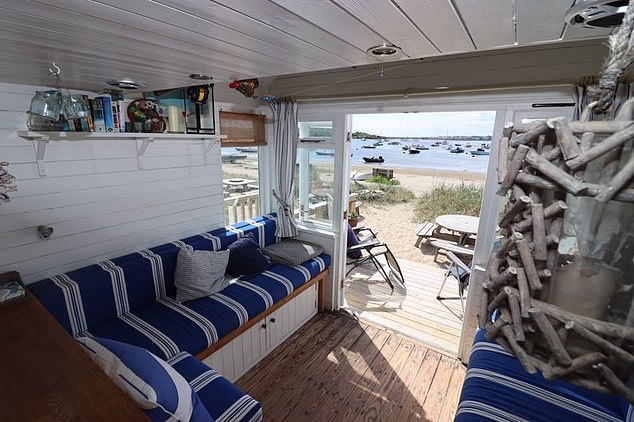
Spend the night under the stars at Mudeford Sandbank
A charming blue and white beach hut on the rugged Mudeford Sandbank may have once been used by several generations of the same family, but can now be rented on Airbnb for £2,974 per week, or £11,896 per month.
By comparison, residents of the nearby village of Christchurch spend around £1,233 a month on rent, according to property website Zoopla.
On top of the eye-watering price tag of £464 per night, there is also a £40 cleaning fee and £150 in taxes for a week’s stay.
The property has a mezzanine floor for four people and comes with everything you need for a day at the beach, including a kayak, beach towels and parasol, but no bathroom.
When nature calls, the toilet block is 50 meters away and there are plenty of cold showers available (or a dip in the sea).
A few doors down, a whitewashed beach hut with four single beds and uninterrupted views across the Isle of Wight is available for £1,579 a week, including a £229 “Airbnb service fee,” which the website says goes toward customer support and running the platform fees.
For that price, guests receive bed linen, towels and a small barbecue.
But despite costing £263 per night, the hut has a minimum stay of seven nights, making it almost as expensive as a typical family holiday, which cost £1,944 last year, according to insurer Legal & General.
There are just 346 beach huts on Mudeford Sandbank and prices have skyrocketed over the past twenty years as demand far exceeds supply.
In 2002, a hut on the peninsula sold for £73,000, but ten years later a nearby hut sold for more than double that, at £170,000.
By comparison, a typical beach hut in Britain is worth £42,999, according to Rightmove.
Andy Denison, from estate agent Denisons in Christchurch, Dorset, says beach huts in Mudeford are so expensive because of council regulations, which allow overnight stays between March 1 and October 31.
“In Mudeford you can sleep in a beach hut, but in other areas you can only use them as a day hut,” he says.
‘The demand is very high. I’ve heard stories of people making around £300 a night renting out their beach huts.’
There are more than 20,000 beach huts in Britain, but overnight stays are banned by most councils, including the New Forest in Hampshire, Swanage in Dorset and Abersoch in Wales.
Each municipality also has its own rules about the appearance of the beach huts in its area and may ban activities such as barbecues and loud music.
But while guests in these areas won’t be able to sleep in beach huts, they can still expect to pay more than £100 a day to rent one through Airbnb.
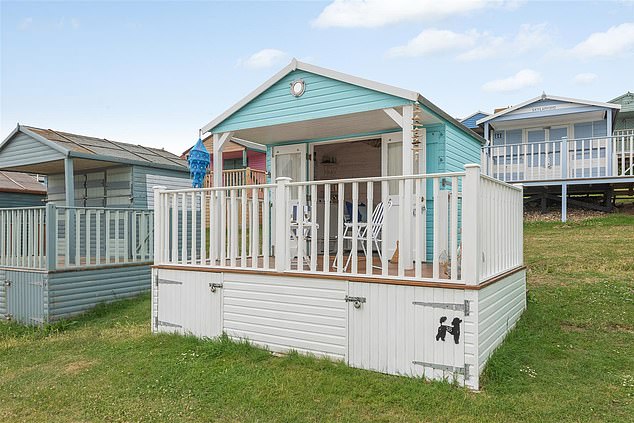
This beautiful cabin in Whitstable, Kent can be yours for £140 between 9:30am and 5:30pm. From the wooden balcony you can enjoy beautiful coastal views as pictured below
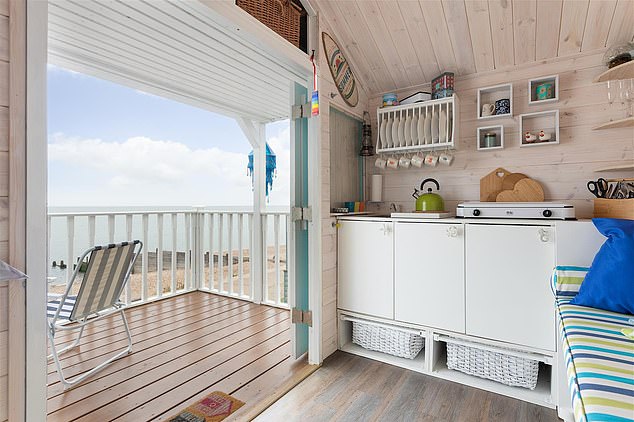
Spend a day in Whitstable
A vintage-inspired beach hut just outside picturesque Whitstable in Kent can be rented between 9:30am and 5:30pm for £140, including a £20 Airbnb service charge.
For a six day stay this would amount to £840 for a family of four, without taking into account overnight accommodation costs.
For that amount, guests can use the gas hob, kitschy crockery, a hob and a shelf full of books.
Enjoy the sun in Southwold
Meanwhile, a pinstripe hut in the village of Southwold, near the mouth of the River Blyth on the Suffolk coast, can be booked for £81 a day, including the eye-watering £16 cleaning fee and £12 service charge.
Although the decoration inside is minimal, there are plenty of beach toys for kids, including the essential bucket and spades.
Kathryn Ferry, from the Seaside Heritage Network, says the rising price of beach huts is a microcosm of what is happening more widely in seaside towns.
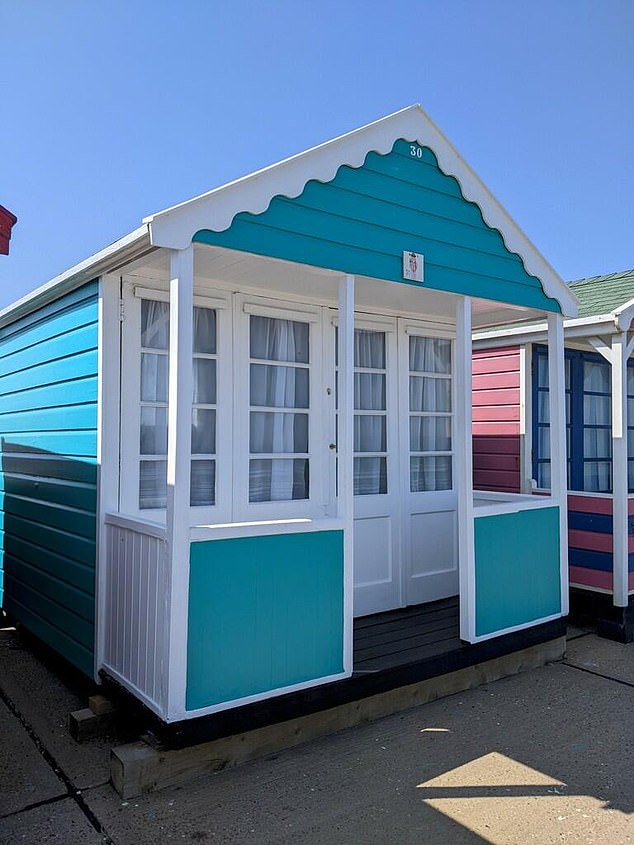
Painted in a light blue shade, this charming beach hut in Southwold on the Suffolk coast costs just £81 per day and comes equipped with a small hob, as pictured below. But beware of the high cleaning fee of £16
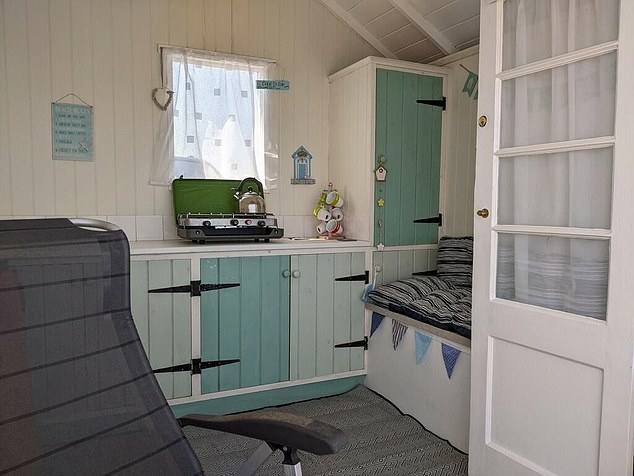
“Many beach huts have been passed down from generation to generation, but the rise of Airbnbs is putting that at risk,” she says.
“As more homes are converted into Airbnbs, the soul and community are being taken away from these areas, while the existing community is being displaced.”
An Airbnb spokesperson said: “Beach Cabins are an example of extraordinary Airbnb stays that have captivated travelers around the world for more than a decade.
‘Airbnb allows guests to book a wide variety of unique and magical homes that go beyond your traditional hotel room, at any price.
“We empower everyday people to become hosts and offer unique stays that boost tourism in destinations that depend on it.”
Some links in this article may be affiliate links. If you click on them, we may earn a small commission. That helps us fund This Is Money and keep it free to use. We do not write articles to promote products. We do not allow a commercial relationship to affect our editorial independence.
